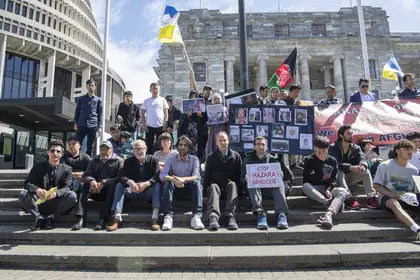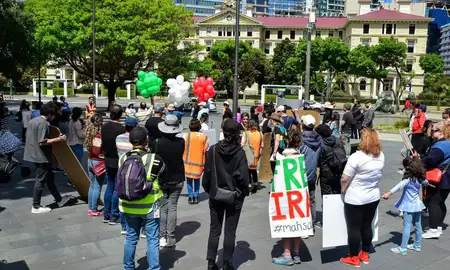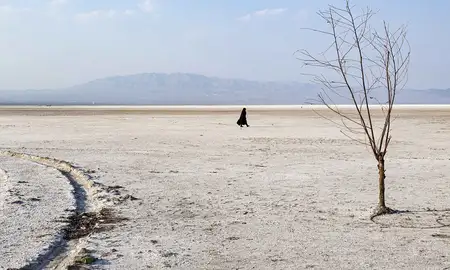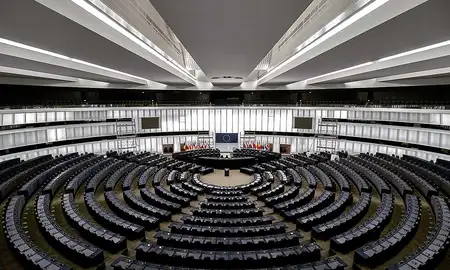
Kiwi-Hazara ethnic women, men and other New Zealanders including activists participate in an anti-Taliban demonstration in front of Parliament in Wellington on October 18. Photo credit: Massoud Hossaini.
To many members of the Hazara community of Afghanistan, the world seems indifferent about the Taliban’s leadership and the gradual genocide of their minority ethnic and religious group. Their suffering in Afghanistan did not begin with the Taliban, but the targeted killings and discrimination against Hazara have escalated drastically since the Taliban signed an agreement with the US and dominated the politics of Afghanistan in 2021.
In the last year, hundreds of Hazara have been killed by suicide attacks from the Taliban or the Islamic State of Khorasan (a branch of ISIS in Afghanistan).
Civil society and women activists have been opposing the Taliban’s promotion of the discourse of violent religious intolerance that is exclusive, misogynistic, and sectarian. Their voices, however, haven’t been heard globally. In fact, since the US withdrew from Afghanistan, the country became a forgotten land in international politics and has been left to the brutality of the Taliban. The only resistance to this hegemonic rule comes from an active, dedicated, but disempowered civil society and women.
The political system in the country is in chaos and the Taliban is only concerned with strengthening their hegemony over politics by killing, assassinating and fighting its opponents. The historical record of the Taliban’s violence against women and Hazaras is such that it kills any hope for Afghanistan’s future. Nevertheless, there is no obvious sign of concern from the international community.

Dr Negar Partow.
Chaos, corruption and poverty has spread across Afghanistan since the withdrawal of the US forces, with no guarantee from the Taliban to end the climate of insecurity in Afghanistan by negotiating political power with others in Afghanistan.
Virulent attacks on schools, killing Hazaras and the discriminatory laws that the Taliban has coerced on them has inspired activists inside and outside of Afghanistan to form a global campaign, under the hashtag #stophazaragenocide, that acknowledges the killing of Hazara as genocide, and to stop the growing insecurity that they feel in their community.
Now after more than a year of their rule, the Taliban has proved that they have no interest in preventing the killing of Hazara. None of the attacks since 2021 have been investigated by the Taliban. The victims of these crimes are ignored by the Taliban, and their community has never been compensated or acknowledged. The Taliban not only ignores these killings but also contributes to their continuity through promoting an anti-Hazara and anti-Shi’a political discourse. If questioned, the Taliban often claims that it is unable to control the extreme factions such as the Islamic State of Khorasan (a branch of ISIS in Afghanistan), or even those Taliban who commit these crimes. The unanswered question for the international community is how such an incapable group with such an extremist ideological position have been left to rule a country.
According to a report by Human Rights Watch, since the Taliban’s takeover, their “affiliates has claimed responsibility for 13 attacks against Hazaras and has been linked to at least three more, killing and injuring at least 700 people”. In April 2022, a bomb attack on an all-boy high school and an education centre killed six and injured 20. On 30 September 2022, a terrorist attack targeted girl students in the Kaaj Educational Centre in Kabul, who were preparing for their school exam, in the predominantly Hazara neighbourhood of Dasht-e-Barchi. The attack killed 40 students and injured many.
These attacks have revealed that the Taliban is eager to revive its largely violent record and to express that its new political order has no shame in exercising force or spreading fear in order to rule. An early test of the Taliban’s failure was their inability and lack of will to respond to the outbreaks of violence against women and Hazaras in Kabul and elsewhere since 2021.
On the contrary, they have given their followers reassurances that their rule remains uncontested and comfortably express their strong opposition to education, economic independence and security, particularly for women and girls.
They have banned women from appearing in public without a blood relative, from wearing high-heeled shoes, speaking loudly in public, or even appearing on the balconies of their houses.
Women have been removed from their positions at workplaces and have been dealing with food insecurity, hunger, poverty and constant harassment.
Under the rule of the Taliban in Afghanistan, no other group or idea has the right to participate in political life, and any civil rights movement is labelled as treason against the country. Women have been at the forefront of resistance against the Taliban and in doing so, they are being harassed, beaten and arrested by them.
Similarly, Hazara, who are terrorised by the Taliban for being Shi’a, have raised many concerns in their protests, asking liberal governments, such as that of Aotearoa New Zealand, to assist them to stop the gradual genocide and violation of their rights, which is highlighted in Amnesty International’s September report.
What we, as global citizens and as liberal democracies, do to address the targeted killing of Hazara and women in Afghanistan will matter significantly for the future of human rights in the world. To suppose that the Taliban will create a safe state for the people of Afghanistan is a false hope. They have expressed their real views about the goal of their Islamic state defiantly and unapologetically, without being worried about any consequences.
Moreover, they have no incentive to respect the rights of women or ethnic minorities and in fact see their survival in the perpetuation of insecurity and violence. Thus, any depiction of the Taliban government as a pragmatic, responsible and responsive government that thinks about the prosperity and progress of Afghanistan only further contributes to the violation of Afghanis’ rights.
In Afghanistan’s national political background, there is a void that the new round of Taliban’s atrocities has created and enjoys. This is not a matter of the non-existence of sound political voices – these voices exist, but have escaped, been coerced or even killed, either by the Taliban or another armed Islamist group.
It is inconceivable, and impossible for the Taliban, who claim to be devoted Sunni Muslims, to govern without manifesting, claiming and coercing the values they attribute to Islam, including retracting their promises of amnesty, women’s right and media freedom.
As their political history underscores, the Taliban is theologically inflexible and rejects explanations that highlight civil experiences and the needs of people. What is distinctive about their political languages is its concern with resisting secularisation, ethnic diversity and any attempts for women’s rights.
For the Taliban, to be religious is to submit to their political ideals, and the role of a religious faction is to dominate politics. Hence, the Taliban see no political or religious reason to limit the daily exercise of power and coercion of religious rules.
What is encouraging, however, is the courageous resistance of women inside Afghanistan and the global campaigns led by Afghanis around the world, which has led to the Taliban’s atrocities being exposed and known to the world. In looking to the future, however, the genocide of the Hazara could only be stopped with the support of the international community, and the United Nations, to hold the Islamic State of Afghanistan accountable for their crimes and focus on the security of people in the country.
Dr Negar Partow is a Senior Lecturer in security studies at the Centre for Defence and Security Studies, at Massey University.
More news
Opinion: The momentous United Nations Security Council meeting on Iran
Senior Lecturer Dr Negar Partow from Massey's Centre for Defence and Security Studies writes about the recent UN meeting that addressed the actions of the Islamic Republic.

Opinion: With an Iranian Feminist Revolution on the rise, the future of political Islamism is determined
Senior Lecturer Dr Negar Partow from Massey's Centre for Defence and Security Studies offers insights into the women's movement in Iran.

Opinion: International Women's Day and toxic masculinity in international security
We are celebrating International Women’s Day in 2022 in a time when the lack of women’s presence in international negotiations on peace and security is more evident than ever.
